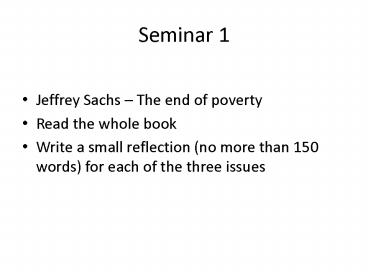Seminar 1 - PowerPoint PPT Presentation
1 / 27
Title: Seminar 1
1
Seminar 1
- Jeffrey Sachs The end of poverty
- Read the whole book
- Write a small reflection (no more than 150 words)
for each of the three issues
2
Seminar 1
- No more than one page for all three issues
- Hand in on 15th of September
- Graded with Pass or Fail
- If you cannot attend the seminar, write an
additional page.
3
North Institutionalism
- Rules of the game
- Increase efficiency of the economy
- Not static but changes with time
- Factor prices
- Transaction costs
4
The rise and decline of feudalism
- Feudalism 500-1500 AD
- Western Europe rose out of the ashes of the Roman
Empire - Had its institutional foundation in the Roman
empire - The manor
- serfs
- slavery
5
Feudal Europe
- Land was granted to knights by the king in return
for military services - The Ruler fighter/class had
- serfs and freemen
- Worked the lands of the ruler
- Worked land granted by the ruler
6
Feudal Europe
- Farmer worked for the right to use lands
- Farmers stayed under the protection of the lord
- The lord had military might
7
Feudal Europe
- Land only valuable with labour
- Labour needed to be protected
- High transaction costs to both farmer and
landlord - Trade low level and very high transaction costs
8
The decline of Fedualism
- Safety
- Population increase
- Crowding
- Diminishing returns
- Colonisation of Western Europe
- Towns
- Specialisation
9
The decline of Fedualism
- Factor prices changed
- New land regulations
- The position of the farmer weaken
- Trade increases
- Lords protect the traders
- Granted privileges
- Still on a low level
- Diminishing real wages
- Food consumption down
- The plague
10
The decline of Feudalism
- Relative factor price of labour increase
- Strengthening the farmers
- Escaping the manorial lands
- Competition over the labour force
11
The decline of Feudalism
- The town guilds strengthen their control
- Tenants get stronger rights
- Manorial courts lose jurisdiction
- The king gains influence
12
Europe 1500
- Many small kingdoms
- Great rivalry
- Little trade
- Luxury consumtion
- Great wealth and great inequality
13
The birth of modern Europe
- England the glorious revolution
- France the french revolution 1789
- But what happened in the 300 years leading up to
this?
14
- Cycles of growth and decline over this time
- The decline of the Iberians
- The rice of Northwestern Europe
15
Iberians
- Output slower than population growth
- Luxury consumption
- Wars
- Metals from Latin America
16
England
- Arguably the most successful of the of the
western powers - Went from a small kingdom to the most powerful
country in the world between 1500 and 1700 - A pressing need for the King to find revenue
17
England
- The Tudors
- Grants and priviliges
- Confiscating monastic land
- Allied with merchants and the parliament
- The wool conflict
- King kept tax revenues
- Parliament decided tax levels
- Merchants recieved a monopoly
18
England
- Wooltrade declined but the right to tax remained
with parliament - The control of property rights to the parliament
- Weak nobility
- Weak King
- Strong merchant class
19
- The Industrial revolution
- Dramatically increased standards of living
- Industry and services dominate
- Urbanisation
- Continous technological change
20
England
- The Industrial revolution
- Textile industry
- Refining wool
- Northern England
21
England
- The enclosure movement
- Value of land increased
- Land was transformed to pasture
- Small investments in new technology
- Putting out system -gtFarmers became
- Weavers
- Spinners
- Supplementary income
- Hard to control
22
England
- Second enclosure movement
- Sources of income removed from the farmers
- The commons privatised
- Productivity increases
- Landless farmers became workers
- Markets expanded -gt need to increase production
- High transaction costs
- Factories
23
England
- From wool to cotton
- Result of the competition with Holland
- Import of cotton from
- India
- America
- Landowners lost power to the merchants
24
England
- Industries needed resources
- Cotton
- Rubber
- Iron
- Coal
- Products from the world refined in England
- The workshop of the world
25
England
- Trade
- New cheap transportation
- Steam engines
- Cheaper transportation
- Comparative advantages used by the English
capitalists
26
England
- The second Industrial revolution
- Technology and science to sustain the growth
- The decline of the Churchs monopoly of education
- Managerial development
- Replacing man with machine
- Property rights
27
Rest of Europe
- Industrialisation spread across Europe
- Core nations
- Levels of backwardness
- English capital spreading to other countries
- Funding the railroads of Europe































